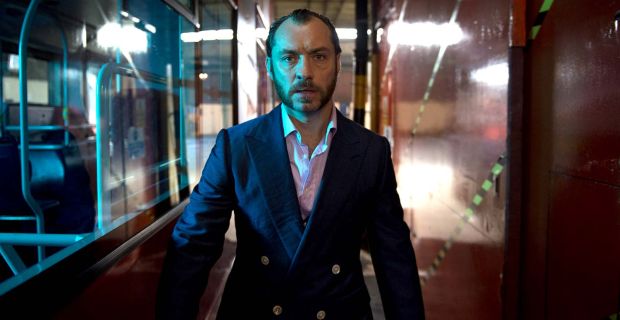
Movie: Dom Hemingway
Directed by: Richard Shepard
Starring: Jude Law, Richard E. Grant, Demián Bichir, Emilia Clarke
As comfort zones go, it’s arguable Jude Law doesn’t really have one. People seem to mentally typecast him as some kind of posh toff, when in reality he’s been one of the edgier actors of his generation. Granted, audiences are more likely to know him from The Holiday or Sherlock Holmes as opposed to Side Effects or eXistenZ, but it still seems that his aesthetic qualities are played up over his choice of roles. Unfortunately, Dom Hemingway probably won’t do much to change this. It’s easily one of the strangest roles of his career and Law is characteristically excellent, but it forms part of such a confused and meandering film that it’s unlikely to ever really see the light of day once the initial dust settles.
There’s a lot to be said for something that opens with a monologue bordering on perverse slam poetry, but what early appeal this may foster is soon lost to sluggish pace, uncertain narrative, and a wholly unbelievable world that does little to endear its viewers. The titular Dom Hemingway (Law) has spent 12 years in prison for refusing to dob in a crime boss. He’s a safe cracker, proudly (and frequently) proclaiming himself to have “magic fingers,” and for his time inside is eagerly anticipating a fruitful pay off from Mr. Fontaine (Demián Bichir). Once he gets back on the street, he meets up with his friend Dickie (the perennially wonderful Richard E. Grant) and travels to the south of France to pick up his reward. Naturally, all does not go quite according to plan, and Dom soon finds himself back in London, bereft and pining after his estranged daughter Evelyn (Emilia Clarke).
There is a tendency to over-praise actors who undergo physical changes for a part (see everyone’s obsession with Christian Bale’s paunch and comb-over in American Hustle for a recent example), but in this case there is genuinely something to be said for Law’s transformation. He’s gained weight, the token dodgy haircut and a fine line in terrible suits to inhabit this richly despicable character, a loathsome appearance personifying the corrupt crime world to which he belongs. As a lead figure, Dom is oddly charismatic despite his many failings – given to bouts of magnificent verbal sparring and eloquent monologues entirely at odds with the bleakness around him. He is frequently hilarious, though the sheer intensity and bravado of Law’s performance tends to fall increasingly flat as the film goes on. Despite its plucky dialogue, the script simply doesn’t create an interesting world for the character. It’s your token seedy London underworld and somewhat akin to Guy Ritchie’s hapless gangster havens, but it has none of the latter’s liveliness or colour. In the absence of a witting environment, Dom’s boorish displays start to feel jaded and more than a little irritating. For a film that’s only 93 minutes long, it shouldn’t feel like it takes an eternity to play out.
The other issue with this is that the film doesn’t quite get to grips with Dom as a character. His personality is clear, but his development is lacking. Given he’s the only consistent presence onscreen, his journey should feel more consequential, especially in the absence of any significant plot developments elsewhere. His criminal connections aren’t fully explored, which in itself is probably forgivable, but a subplot about his relationship with his daughter never bears fruit either. Evelyn’s appearance towards the end seems tacked on, a piecemeal addition designed to give Dom a softer side. Beyond one especially melodramatic scene where he visits his wife’s grave, it doesn’t do much to illuminate him as a central personality. Even for a character clearly supposed to be aimless, he has to be more compelling than this.
In support, Grant is as laudable as ever, though even he can’t salvage the piece. Dickie could be an older version of Clifford from Spice World (which is obviously Grant’s masterpiece), if Clifford finally had lost the plot, hit the drugs, and got mixed up with the wrong people. Clarke is a luminous screen presence and a welcome change from the seedy surrounds, but the half-hearted lump of a subplot doesn’t exactly give her much to do. On the whole, Dom Hemingway is just too peculiar to be likable, its eccentric structure and larger-than-life lead character never quite settling into their comfort zone. It’s a mishmash of one too many wild notions on the part of the makers and seems like too forced an attempt to be irreverent. The character is certainly an original, and Law himself does exceedingly well, but he could really have thrived were he given as much depth as he is presence and a setting that seemed even half as vivid.
SCORE: D
- David Fincher’s ‘Gone Girl’ Gets An Icy New Trailer - July 7, 2014
- SCENE & HEARD: ‘Jersey Boys’ - June 27, 2014
- MOVIE REVIEW: ‘Snowpiercer’ - June 21, 2014
